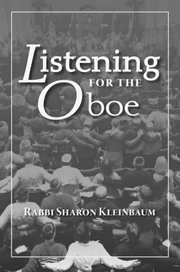Rabbi’s sermons offer both spiritual hope and a strong call to action
“Listening for the Oboe” compiles Kleinbaum’s and the CBST congregation’s favorite sermons given by her between 1992 and 2003, in which she addresses issues as various as the impact of AIDS on the gay community in the early 1990s, the place of children in an LGBT synagogue, CBST’s solidarity with the African-American community on the subject of reparations, the challenges of negotiating the complicated space between democratic leadership and solid organizational structure, and the devastation of September 11, among other topics. Drashot are an integral aspect of CBST and are therefore regularly recorded, as Kleinbaum speaks only from notes.
“I consider the conversations with the congregation one of the most important parts of my rabbinate,” remarked Kleinbaum, who generally delivers two drashot per month at Friday Shabbat services, and additional drashot during the Jewish High Holy Days.
Although initially introduced to Judaism by her parents, Kleinbaum mentions in her introduction to the book that her father would not have specifically identified as “religious,” and that both her mother and father were very progressive and socially active in their community. It was not until she attended Frisch Yeshiva High School of Northern New Jersey that she became truly inspired by Judaism and the more profound questions raised by religion.
“I always had a passion for questions of meaning and purpose in life,” observed Kleinbaum. “It was a fluke that I ended up at Frisch Yeshiva [where I was first] inspired to become very religious, but I couldn’t really be an openly gay person [in that environment] in the mid-70s. So struggling with that, I left Judaism for awhile, until in college I began meeting people who were integrating [religion and gay identity].”
The drashot included in “Listening for the Oboe” are a testament to this integration of “deeply Jewish” and socially conscious values, and Kleinbaum is adamant in her assertion that the two realms in no way contradict one another.
“The religious right-wing has totally hijacked religion,” maintained the Rabbi in a recent interview, adding that, despite increased cultural acceptance of LGBT people since her first years with CBST, in many ways “the religious right-wing in the Jewish community has grown in their anti-gay zealotry,” as in the Protestant and Catholic communities. It is the bigotry and factiousness associated with right-wing religious groups that Kleinbaum feels has co-opted the true value of religion and spirituality.
“The deeper questions that religion asks are [what is] important. Trying to find meaning is what religion is all about. There are deep truths to be learned from every community, but the way to learn the most is to know and be proud of our own traditions,” Kleinbaum added.
Although CBST is geared specifically toward the LGBT Jewish community, it is open to individuals of all sexual orientations, and people of all faiths are welcome to attend services. “We want to model and be religious leaders in a very diverse way,” observed Kleinbaum. “We don’t believe in a bifurcation of sexuality and spirituality.”
Perhaps one of the most poignant, overarching themes of these collected drashot is that of human culpability and obligation versus complacency. In one particularly moving drash, titled “Lift Every Voice and Sing: Communal Teshuvah (repentance or ‘returning to God’) A Jewish Voice for Reparations,” Kleinbaum likens white America’s––and by extension, the Jewish community’s––silence on the subject of slave reparations to the silences that paved the way for the Nazi Holocaust, arguing that “we who point a finger and say that silence is the evil that allowed the Nazis to do what they did––we must not be silent when we see racism in the world around us.”
In addition to issues of social justice and activism, several of the sermons in Kleinbaum’s book deal with the more mundane struggles involved with building solid foundations without neglecting or contradicting the causes to which a particular community is dedicated. In her fifth and tenth-year “State of the Synagogue” addresses, readers are offered a glimpse into some of the difficulties encountered over the course of Kleinbaum’s tenure with CBST, one of the most pressing being the task of creating a healthy work environment for CBST staff. “Building healthy communities is really hard work,” remarked Kleinbaum.
However, hard work is nothing new to Kleinbaum, as she shares in the title-sermon of her book. Using the example of her personal undertaking one summer to master Beethoven’s symphonies, she details the arduousness of tackling unfamiliar spheres, but describes the overwhelming satisfaction she experienced when she finally learned how to “listen for the oboe” in the Ninth Symphony. “I wouldn’t have experienced the oboe without the work I did to learn to listen differently, to learn to listen more deeply,” she declares in this sermon. It is this recognition that “real truth takes a lot of work” and the rejection of what Kleinbaum labels “fast-food spiritual life” that the rabbi hopes readers of “Listening for the Oboe” will take to heart.
Much like her sermons, Rabbi Sharon Kleinbaum’s words of wisdom for the LGBT community are an inspirational blend of spiritual hope and a call to action.
“Take deep and proud responsibility for your own life, commit your life to something bigger, build community so that it will still be here when we’re not, have hope in the midst of great despair and be a part of the changes in the world,” advises Kleinbaum. “We might not be able to solve all the world’s problems, but we can be part of a step in the right direction.”
For more information on Congregation Beth Simchat Torah, or to order a copy of “Listening for the Oboe,” visit cbst.org.
gaycitynews.com


































